Disclaimer: Unless otherwise stated, any opinions expressed below belong solely to the author.
Over the past two years, Google has cut in excess of 13,000 jobs, reportedly to reduce its operating costs. That didn’t stop it, however, from writing a cheque to license Character.AI this August.
The sum? US$2.7 billion.
Character.AI is an artificial intelligence (AI) startup founded by two of its former engineers, Noam Shazeer and Daniel De Freitas, who quit the company in 2021. The service offers personalised conversational chatbots based on fictional or real characters that users can interact with as they would with other humans.
It was Shazeer that Google was reportedly after. The engineer is one of the authors of the breakthrough 2017 paper “Attention Is All You Need”, which introduced the transformer architecture underpinning the development of AI which is changing the world before our eyes.
While at Google, together with De Freitas, Shazeer co-developed a chatbot not unlike ChatGPT, called Meena, who was able to talk about a range of topics a user asked about. In an internal memo, he boldly predicted this new technology would one day replace Google’s search and create trillions of dollars in value.
Unfortunately, he then ran into a problem—not a technical but a social one: Google’s executives refused to release the bot to the public, concerned i.a. about safety risks (though it may have been more than that).
Like many pioneers, Shazeer bounced off the wall of corporate bureaucracy and quit in frustration, accusing the company of not being brave enough. Together with his colleague, he then founded Character.AI, seeded with US$43 million of investor’s money, and did what Google refused to.
Merely three years later, his former employer came knocking with big bucks in hand, netting Shazeer alone a few hundred million dollars.
The deal involves licensing Character.AI’s technology, due to the fact it speeds up access to it by Google, which would otherwise be delayed by a drawn out process, requiring formal approvals from regulatory bodies, should the company be acquired outright.
But, more importantly according to reports, it brought Shazeer back to Google, in a senior role of one of three leaders spearheading the development of the giant’s own AI technology: Gemini. Talk about proving your bosses wrong!
Has Google gone mad?
The sums Big Tech is spending, while making thousands of people redundant, have been raising eyebrows globally over the past two years.
Such is the nature of business, though. You’re paid by how valuable you are to the company. Those 13,000+ people that Google let go since 2023 clearly weren’t able to produce as much as two engineers and 30 or so people who are rejoining the company with them following the deal.
For Google, AI is not so much an opportunity as an existential threat.
As Shazeer himself observed, access to information through intelligent, conversational systems can make Google’s web search obsolete. And that’s a big deal, considering that search advertising is responsible for nearly 60 per cent of the company’s revenue.

Last year, this translated to US$175 billion dollars. As you can see, then, the US$2.7 billion it’s paying to bring back one of the pioneering mavericks of AI is a small price to pay, especially given the threat of acquisition by competitors.
Perhaps when Shazeer was still at Google, the fear wasn’t so much the technology’s safety but precisely the fact that an early release would mean cutting the branch the company was sitting on, since nobody has so far cracked the problem of making money on AI.
It made sense to wait for what others come up with and observe how the market develops. After all, Google itself wasn’t the first search engine in the world when it launched in 1998.
But this reluctance to act made smart people leave, undercutting its ability to compete with AI startups, supported by Google’s rivals, leading to a series of blunders with the release of Bard and later Gemini, which provided all sorts embarrassingly misleading information, like putting glue on a pizza.
The future of Google is now at stake, and it must get all the brainpower it can on board. If it is willing to give people like Shazeer more freedom, it may soon turn out that the billions it spent were the best investment it has made in years.
At the very least, it’s an insurance policy against its competitors, for whom Shazeer and his colleagues could have ended up working against Google’s best interest.
Featured image: Daniel De Freitas and Noam Shazeer, Character Technologies

